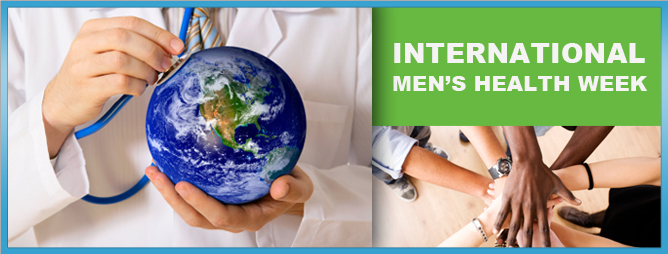International Men’s Health Week 2019 is June 10-16

Led by Men’s Health Network, representatives from six leading men’s health organizations around the world met at the 2nd World Congress on Men’s Health in Vienna, Austria in 2002 and resolved to work together to launch International Men’s Health Week (IMHW). The goal is to increase awareness of male health issues on a global level and to encourage inter- and intra-national institutions to develop health policies and services that meet the specific needs of men, boys, and their families. So, whether you are a man yourself or have a man in your life, you can learn about the leading causes of death among men and how they can be prevented. Here’s what you need to know to live (or help someone live) a longer, healthier life.
Do you know the greatest threats to men’s health? The list is surprisingly short. The top causes of death among adult men in the U.S. are heart disease, cancer, unintentional injuries, chronic lower respiratory disease and stroke, according to the Centers for Disease Control and Prevention. The good news is that making a few lifestyle changes can significantly lower your risk of these common killers.
Start by looking at your lifestyle
Take charge of your health by making better lifestyle choices. For example:
- Don’t smoke. If you smoke or use other tobacco products, ask your doctor to help you quit. Avoid exposure to secondhand smoke, air pollution and chemicals, such as those in the workplace.
- Eat a healthy diet. Choose vegetables, fruits, whole grains, high-fiber foods and lean sources of protein, such as fish. Limit foods high in saturated fat and sodium.
- Maintain a healthy weight. Losing excess pounds — and keeping them off — can lower your risk of heart disease as well as various types of cancer.
- Get moving. Exercise can help you control your weight, lower your risk of heart disease and stroke and possibly lower your risk of certain types of cancer? Choose activities you enjoy, such as tennis, basketball or brisk walking. All physical activity benefits your health.
- Limit alcohol. If you choose to drink alcohol, do so only in moderation. That means up to two drinks a day for men age 65 and younger and one drink a day for men older than age 65. Examples of one drink include 12 fluid ounces (355 milliliters) of beer, 5 fluid ounces (148 milliliters) of wine or 1.5 fluid ounces (44 milliliters) of standard 80-proof liquor. The risk of various types of cancer, such as liver cancer, appears to increase with the amount of alcohol you drink and the length of time you’ve been drinking regularly. Too much alcohol can also raise your blood pressure.
- Manage stress. If you feel constantly on edge or under pressure, your lifestyle habits may suffer — and so might your immune system. Take steps to reduce stress — or learn to deal with stress in healthy ways.
Stop avoiding the doctor
Don’t wait to visit the doctor until something is seriously wrong. Your doctor can be your best ally for preventing health problems. Follow your doctor’s treatment recommendations if you have health issues, such as high cholesterol, high blood pressure or diabetes. Also, ask your doctor about when you should have cancer screenings, immunizations and other health evaluations.
What else puts you at risk?
Motor vehicle accidents are another common cause of death among men. To stay safe on the road, wear your seat belt. Follow the speed limit. Don’t drive under the influence of alcohol or any other substances, and don’t drive while sleepy.
Suicide is another leading men’s health risk. An important risk factor for suicide among men is depression. If you have signs and symptoms of depression — such as feeling sad or worthless and a loss of interest in normal activities — talk to your doctor. Treatment is available. If you’re contemplating suicide, call for emergency medical help or go the nearest emergency room.
The bottom line
Understanding health risks is one thing. Taking action to reduce your risks is another. Start by making healthy lifestyle choices. The impact might be greater than you’ll ever know